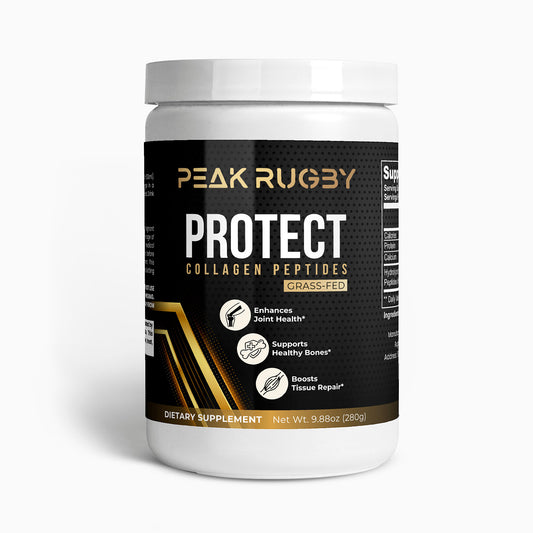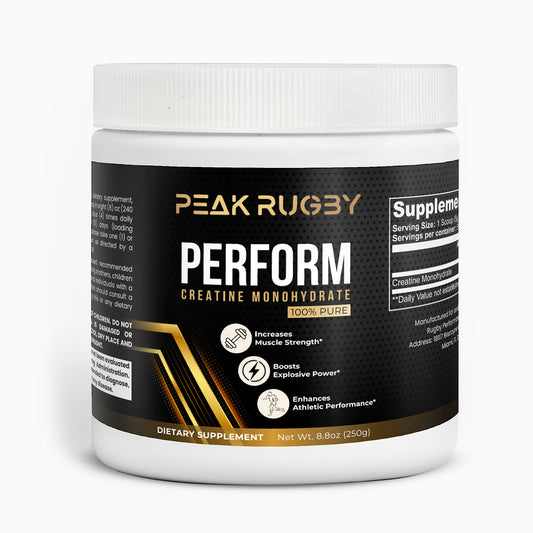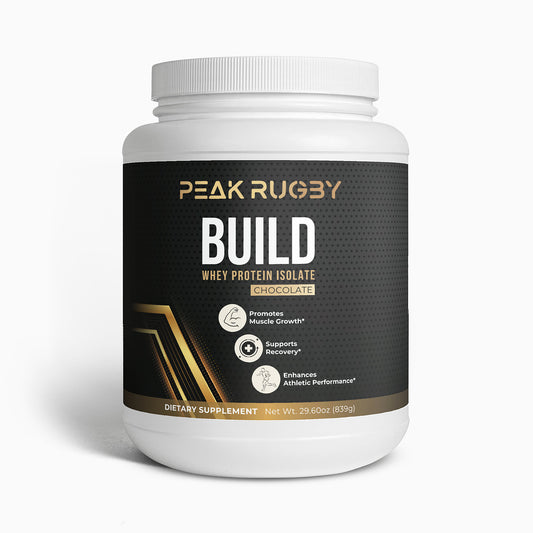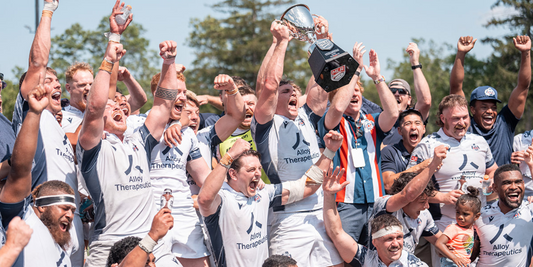Protein is one of the most important nutrients for any rugby player—especially if you’re training hard, building strength, or recovering from contact. It’s what your body uses to rebuild muscle, protect soft tissue, and stay strong through long seasons.
In Part 5 of the Fuel for Performance Series, we’re taking a closer look at protein—why it’s essential, how it supports performance and recovery, and what types work best for rugby athletes.
Here’s what we’ve covered in other parts of the series:
- Part 1: Breakfast – Boost Energy & Recovery
- Part 2: Hydration – Improve Endurance & Delay Fatigue
- Part 3: Carbohydrates – Sustain Power & Stamina
-
Part 4: Fats – Enhance Recovery & Brain Function
- Part 6: Pre-Game Meals – Maximize Energy & Avoid Fatigue
- Part 7: Post-Game Meals – Rebuild Tissue & Restore Energy
- Part 8: Pre-Workout Meals – Fuel Up & Train Strong
- Part 9: Post-Workout Meals – Recover & Build Strength
Let’s break it down.
WHAT IS PROTEIN?
Protein is one of the three macronutrients (alongside carbohydrates and fats) and is made up of amino acids—often called the building blocks of muscle. Your body uses protein to repair damaged tissue, build strength, recover after tough training sessions, and maintain overall structure and function.
Unlike carbs and fats, your body doesn’t store protein in large reserves, so you must consume it consistently throughout the day—especially if you’re training hard and playing rugby.
There are different types of proteins that rugby players should understand:
- Whey Protein – A fast-digesting, complete protein ideal for post-training recovery. It contains all essential amino acids and is especially high in leucine, which triggers muscle protein synthesis. (e.g., PEAK RUGBY BUILD)
- Casein Protein – A slow-digesting protein perfect for nighttime use, helping reduce muscle breakdown while you sleep.
- Collagen Protein – Rich in amino acids like glycine and proline, it supports joint, tendon, ligament, and soft tissue health—ideal for injury prevention and recovery. (e.g., PEAK RUGBY PROTECT)
- Plant-Based Proteins – Derived from sources like peas, rice, and hemp; good for those who avoid dairy, but often lower in essential amino acids unless combined.
Now that we’ve covered the basics, let’s explore why protein is essential for rugby athletes.

WHY PROTEIN MATTERS FOR RUGBY PLAYERS
1. Repairs Muscle Damage After Training
Rugby is a high-impact, high-intensity sport that breaks down muscle tissue. Protein provides the amino acids needed to repair and rebuild, which supports recovery and helps you return to training stronger.
2. Promotes Lean Muscle Growth & Strength
Whether you're trying to bulk up or maintain a solid frame during the season, protein is necessary for muscle protein synthesis—the process your body uses to grow stronger muscle fibers after stress.
3. Supports Tendons, Joints & Injury Recovery
Collagen protein and other connective tissue-supporting proteins help maintain joint integrity, tendon resilience, and ligament strength—crucial for injury prevention and long-term health.
4. Enhances Recovery & Reduces Soreness
Regular protein intake, especially post-exercise, accelerates muscle repair and reduces DOMS (delayed onset muscle soreness), so you’re ready for the next session.
5. Helps Maintain Optimal Body Composition
Protein helps you stay lean by preserving muscle mass and supporting fat metabolism. It also helps keep you fuller longer, curbing cravings and bad snacking habits.
HOW TO OPTIMIZE PROTEIN INTAKE
1. Include Protein in Every Meal
To maintain a steady stream of amino acids, spread protein intake across all meals and snacks.
Great protein-rich foods:
- Eggs, egg whites
- Chicken, turkey, lean beef
- Fish (salmon, tuna, cod)
- Greek yogurt, cottage cheese
- Protein powders (Whey Isolate, Collagen, Casein)
- Lentils, beans, tofu, tempeh, quinoa (for plant-based)
2. Calculate Your Daily Needs
Most rugby players need 1.6 to 2.2g of protein per kilogram of body weight. A 90kg player should aim for 145–200g of protein daily.
3. Prioritize Post-Workout Protein
Within 30–60 minutes after training or games, consume 20–30g of fast-digesting protein to jumpstart recovery.
Examples:
- Whey protein shake (PEAK RUGBY BUILD) + banana
- Chicken + sweet potatoes + greens
- Tuna wrap + fruit + water
4. Add Collagen for Soft Tissue Support
Before training or as part of your recovery stack, collagen protein (PEAK RUGBY PROTECT) can support tendon, ligament, and joint repair—especially important in a contact sport like rugby.
5. Consume Casein or Whole-Food Protein Before Bed
This helps fuel overnight muscle repair and reduce muscle breakdown while you sleep.
Examples:
- Cottage cheese + berries
- Greek yogurt + walnuts
- Casein protein shake
COMMON PROTEIN MISTAKES TO AVOID
1. Not Eating Enough Protein
Skipping meals, neglecting breakfast, or eating carb-heavy meals without protein slows recovery and weakens performance.
2. Depending Too Much on Supplements
Protein shakes are convenient—but they should supplement a diet filled with whole food sources like meats, eggs, and legumes.
3. Poor Protein Quality
Avoid heavily processed meats or sugary bars. Stick with clean, high-quality sources with full amino acid profiles.
4. Poor Timing Around Training
Waiting too long after training to refuel, or not consuming protein before bed, limits your gains and slows down recovery.
FINAL THOUGHTS: PROTEIN BUILDS RUGBY PLAYERS
That wraps up Part 5 of our Fuel for Performance Series. Protein is a foundational piece of rugby nutrition, essential for:
- Recovery
- Performance
- Injury prevention
- Long-term development
Build every meal around high-quality protein, use whey or collagen strategically, and never miss your post-training recovery window.
How do you hit your daily protein goals? Drop your favorite protein-rich meals or supplements in the comments.
If you found this article helpful, don’t forget to:
- Like and share this post with your teammates and fellow rugby fans
- Bookmark the blog to stay updated on the next rounds
- Follow @gopeakrugby on X and Facebook and subscribe to our Youtube Channel for more rugby analysis, match recaps, and insights


















